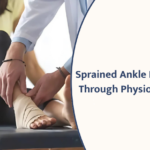Sports injuries are a common concern among athletes, fitness enthusiasts, and even those who engage in regular physical activity. These injuries can range from minor muscle strains to severe ligament tears, and if not treated properly, they can hinder performance or lead to long-term complications.
One of the most effective and widely recommended treatments for sports injuries is physiotherapy. It not only helps in managing pain but also plays a crucial role in full functional recovery. But how effective is it really? Let’s explore in detail.
The Role of Physiotherapy in Injury Recovery
Physiotherapy is a science-based profession that focuses on restoring movement and function when someone is affected by injury, illness, or disability. In the context of sports injuries, physiotherapy becomes especially important because it addresses not just the symptoms but also the root cause of the problem.
When an athlete sustains an injury, the body goes through a series of healing phases—initial inflammation, tissue repair, and remodeling. A physiotherapist understands these phases and designs a rehabilitation program that supports the natural healing process, reduces downtime, and ensures optimal recovery.
Pain Management Without Dependence on Medication
One of the biggest advantages of physiotherapy is that it offers drug-free pain relief. Injuries often come with inflammation, stiffness, and muscle tightness, all of which contribute to pain. Instead of relying solely on painkillers or anti-inflammatory drugs, physiotherapists use hands-on techniques, movement therapy, and modalities like TENS or ice/heat therapy to reduce discomfort naturally.
This approach not only addresses the pain but also improves mobility and encourages the body to heal efficiently, avoiding the side effects of long-term medication use.
Restoring Mobility, Strength, and Function
After an injury, muscles can weaken, joints may become stiff, and overall flexibility can decrease. Without proper rehabilitation, these issues can linger for months or even lead to permanent limitations. Physiotherapy provides structured rehabilitation that gradually reintroduces movement and strengthens the affected areas.
For example, if someone has suffered a knee ligament injury, a physiotherapist will guide the patient through a progressive plan—starting with gentle movements, then moving to weight-bearing exercises, and finally sport-specific training. This systematic progression ensures that the athlete returns to their pre-injury performance level safely and confidently.
Preventing Future Injuries
Beyond recovery, physiotherapy also focuses on injury prevention. Many sports injuries occur due to poor biomechanics, muscle imbalances, overuse, or incorrect posture. A physiotherapist assesses your movement patterns, flexibility, and muscle strength to identify potential risk factors.
By correcting posture, recommending proper warm-up routines, and suggesting adjustments in technique, physiotherapy can significantly reduce the risk of re-injury. This is especially valuable for athletes who want to stay at the top of their game for the long run.
Building Confidence Through Recovery
A sports injury doesn’t just affect the body—it also takes a toll on mental health. Many athletes feel fear, frustration, or anxiety about returning to their sport. Physiotherapy helps rebuild that confidence. Through constant support, education, and gradual progress, patients not only regain physical strength but also the trust in their body’s ability to perform again.
Knowing that you’re being guided by a qualified expert makes a huge difference in how you approach your recovery and return to activity.
Ready to Recover the Right Way?
If you’re dealing with a sports injury and want a safe, personalized recovery plan, physiotherapy is your best option. Consult Dr. Ranjeet Ghatge, an experienced physiotherapist in Magarpatta, for expert guidance, advanced treatment techniques, and long-term injury prevention. Take the first step toward a pain-free, active lifestyle—book your appointment today.





